A Research Project to Evaluate Accounting Issues in the Hotel Industry
VerifiedAdded on 2023/05/28
|5
|1417
|231
Project
AI Summary
This research project aims to evaluate the role of accounting issues within the hotel industry, highlighting the industry's importance in Australia's economic condition. It addresses the necessity for hotel industries to understand accounting's significance for sustaining market position and ensuring profitability. The study poses research questions concerning the meaning of ethical issues, their impact on hospitality performance, and strategies for their elimination. Utilizing both primary and secondary data collection methods, including surveys, interviews, and literature reviews, the research intends to provide a comprehensive analysis. Ethical considerations, such as plagiarism prevention and data security, are emphasized to ensure research integrity, with the ultimate goal of offering insights and recommendations for mitigating accounting-related challenges in the hospitality sector. Desklib offers a range of study tools and resources for students.
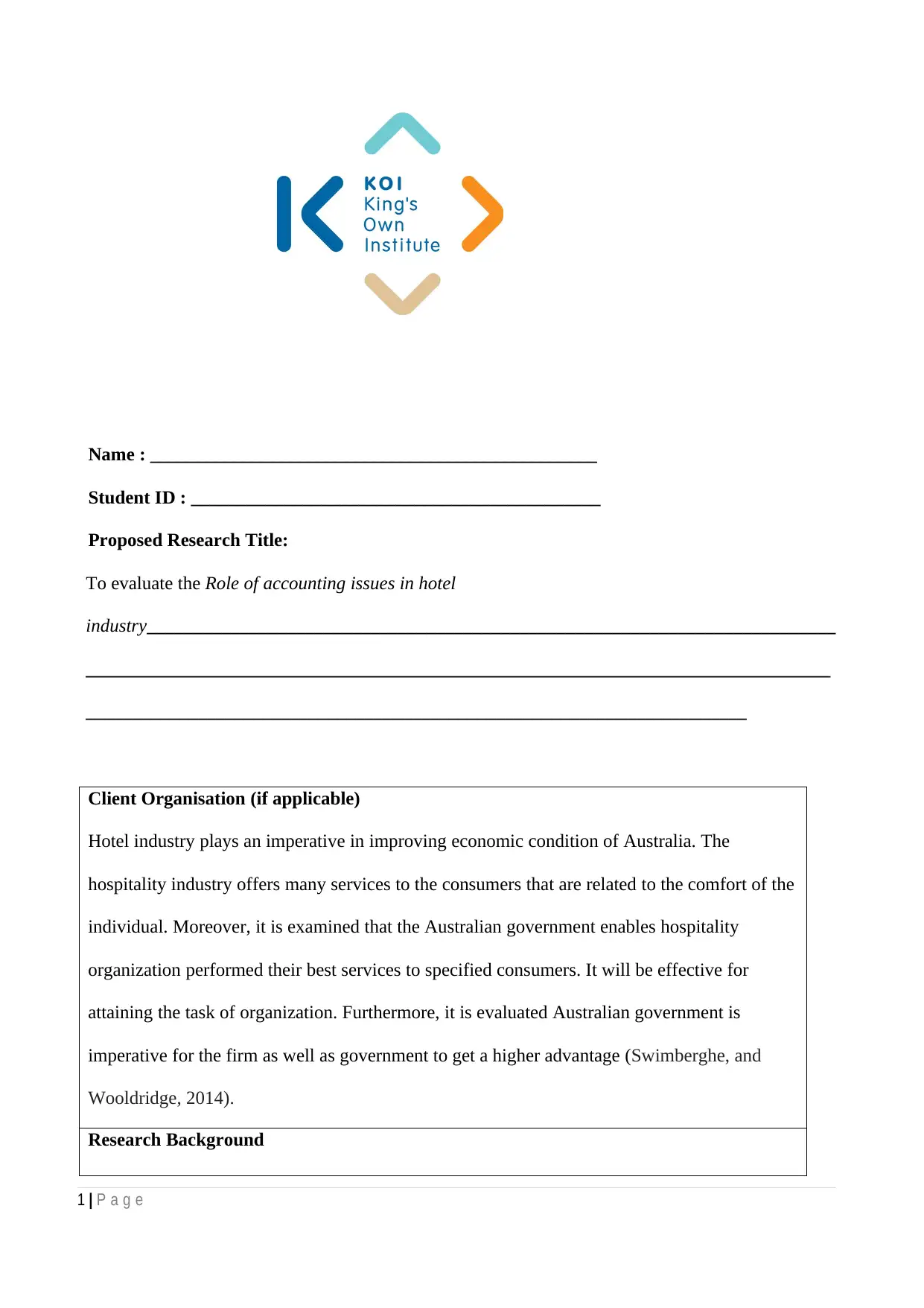
Name : ________________________________________________
Student ID : ____________________________________________
Proposed Research Title:
To evaluate the Role of accounting issues in hotel
industry__________________________________________________________________________
________________________________________________________________________________
_______________________________________________________________________
Client Organisation (if applicable)
Hotel industry plays an imperative in improving economic condition of Australia. The
hospitality industry offers many services to the consumers that are related to the comfort of the
individual. Moreover, it is examined that the Australian government enables hospitality
organization performed their best services to specified consumers. It will be effective for
attaining the task of organization. Furthermore, it is evaluated Australian government is
imperative for the firm as well as government to get a higher advantage (Swimberghe, and
Wooldridge, 2014).
Research Background
1 | P a g e
Student ID : ____________________________________________
Proposed Research Title:
To evaluate the Role of accounting issues in hotel
industry__________________________________________________________________________
________________________________________________________________________________
_______________________________________________________________________
Client Organisation (if applicable)
Hotel industry plays an imperative in improving economic condition of Australia. The
hospitality industry offers many services to the consumers that are related to the comfort of the
individual. Moreover, it is examined that the Australian government enables hospitality
organization performed their best services to specified consumers. It will be effective for
attaining the task of organization. Furthermore, it is evaluated Australian government is
imperative for the firm as well as government to get a higher advantage (Swimberghe, and
Wooldridge, 2014).
Research Background
1 | P a g e
Paraphrase This Document
Need a fresh take? Get an instant paraphrase of this document with our AI Paraphraser
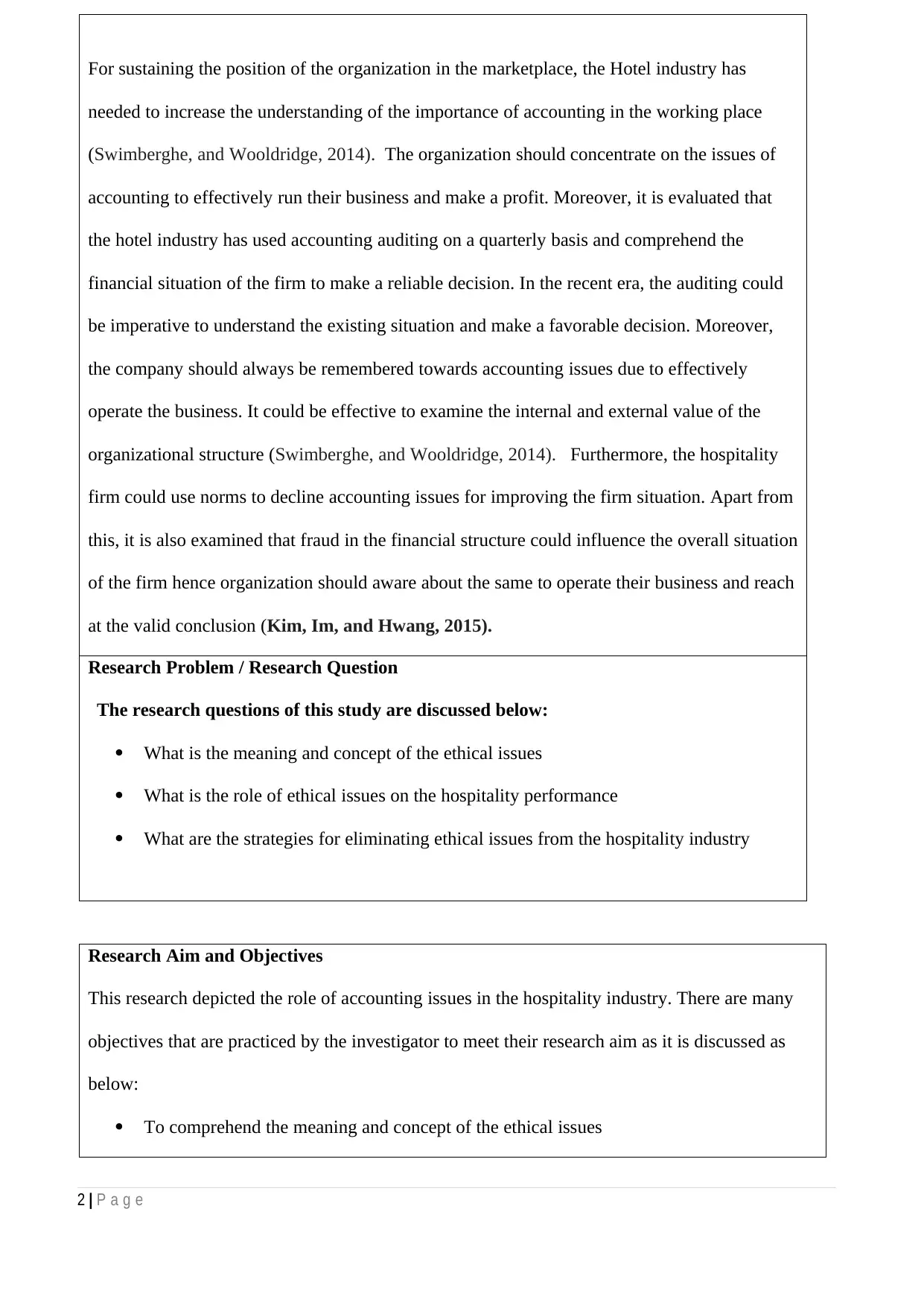
For sustaining the position of the organization in the marketplace, the Hotel industry has
needed to increase the understanding of the importance of accounting in the working place
(Swimberghe, and Wooldridge, 2014). The organization should concentrate on the issues of
accounting to effectively run their business and make a profit. Moreover, it is evaluated that
the hotel industry has used accounting auditing on a quarterly basis and comprehend the
financial situation of the firm to make a reliable decision. In the recent era, the auditing could
be imperative to understand the existing situation and make a favorable decision. Moreover,
the company should always be remembered towards accounting issues due to effectively
operate the business. It could be effective to examine the internal and external value of the
organizational structure (Swimberghe, and Wooldridge, 2014). Furthermore, the hospitality
firm could use norms to decline accounting issues for improving the firm situation. Apart from
this, it is also examined that fraud in the financial structure could influence the overall situation
of the firm hence organization should aware about the same to operate their business and reach
at the valid conclusion (Kim, Im, and Hwang, 2015).
Research Problem / Research Question
The research questions of this study are discussed below:
What is the meaning and concept of the ethical issues
What is the role of ethical issues on the hospitality performance
What are the strategies for eliminating ethical issues from the hospitality industry
Research Aim and Objectives
This research depicted the role of accounting issues in the hospitality industry. There are many
objectives that are practiced by the investigator to meet their research aim as it is discussed as
below:
To comprehend the meaning and concept of the ethical issues
2 | P a g e
needed to increase the understanding of the importance of accounting in the working place
(Swimberghe, and Wooldridge, 2014). The organization should concentrate on the issues of
accounting to effectively run their business and make a profit. Moreover, it is evaluated that
the hotel industry has used accounting auditing on a quarterly basis and comprehend the
financial situation of the firm to make a reliable decision. In the recent era, the auditing could
be imperative to understand the existing situation and make a favorable decision. Moreover,
the company should always be remembered towards accounting issues due to effectively
operate the business. It could be effective to examine the internal and external value of the
organizational structure (Swimberghe, and Wooldridge, 2014). Furthermore, the hospitality
firm could use norms to decline accounting issues for improving the firm situation. Apart from
this, it is also examined that fraud in the financial structure could influence the overall situation
of the firm hence organization should aware about the same to operate their business and reach
at the valid conclusion (Kim, Im, and Hwang, 2015).
Research Problem / Research Question
The research questions of this study are discussed below:
What is the meaning and concept of the ethical issues
What is the role of ethical issues on the hospitality performance
What are the strategies for eliminating ethical issues from the hospitality industry
Research Aim and Objectives
This research depicted the role of accounting issues in the hospitality industry. There are many
objectives that are practiced by the investigator to meet their research aim as it is discussed as
below:
To comprehend the meaning and concept of the ethical issues
2 | P a g e
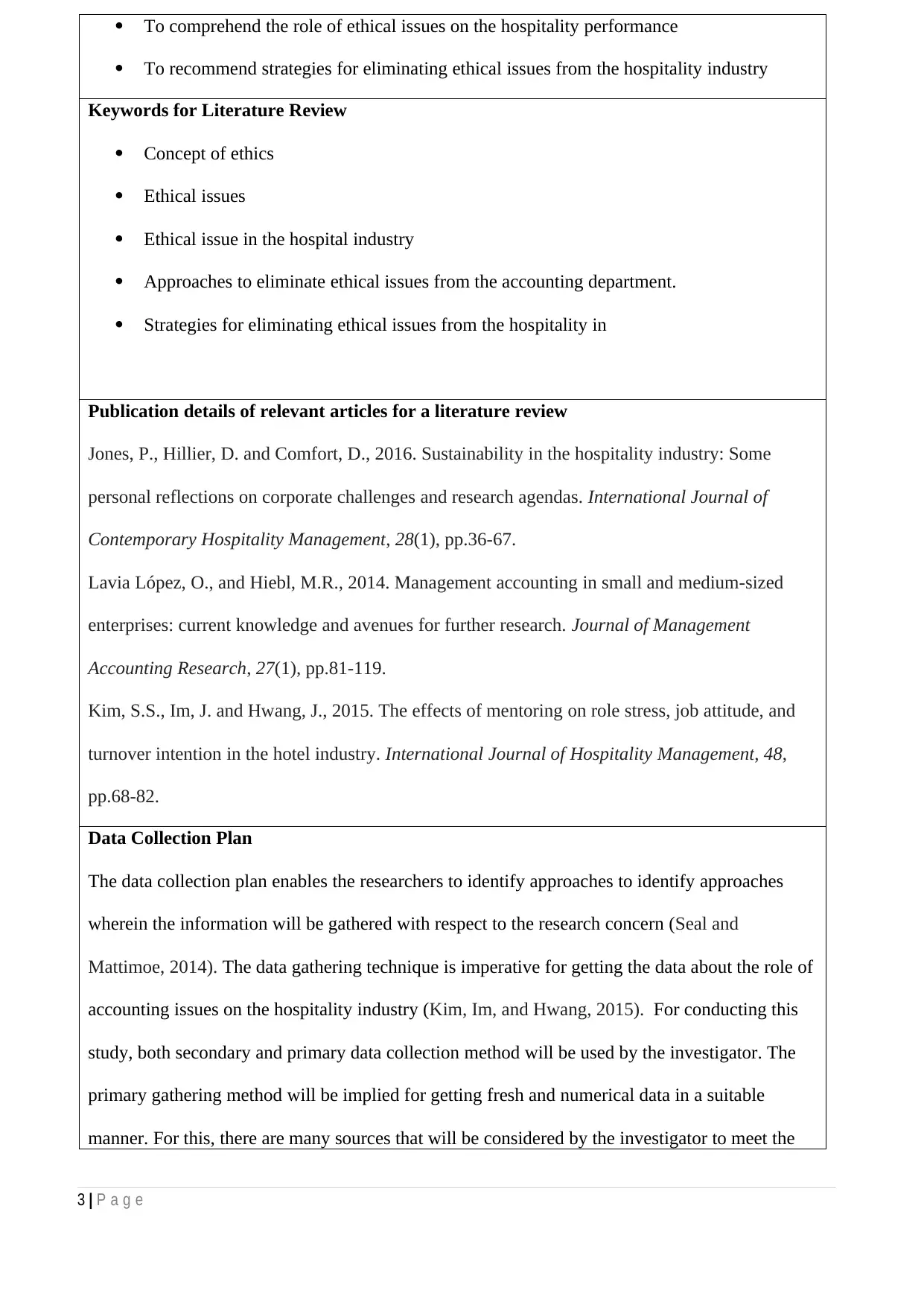
To comprehend the role of ethical issues on the hospitality performance
To recommend strategies for eliminating ethical issues from the hospitality industry
Keywords for Literature Review
Concept of ethics
Ethical issues
Ethical issue in the hospital industry
Approaches to eliminate ethical issues from the accounting department.
Strategies for eliminating ethical issues from the hospitality in
Publication details of relevant articles for a literature review
Jones, P., Hillier, D. and Comfort, D., 2016. Sustainability in the hospitality industry: Some
personal reflections on corporate challenges and research agendas. International Journal of
Contemporary Hospitality Management, 28(1), pp.36-67.
Lavia López, O., and Hiebl, M.R., 2014. Management accounting in small and medium-sized
enterprises: current knowledge and avenues for further research. Journal of Management
Accounting Research, 27(1), pp.81-119.
Kim, S.S., Im, J. and Hwang, J., 2015. The effects of mentoring on role stress, job attitude, and
turnover intention in the hotel industry. International Journal of Hospitality Management, 48,
pp.68-82.
Data Collection Plan
The data collection plan enables the researchers to identify approaches to identify approaches
wherein the information will be gathered with respect to the research concern (Seal and
Mattimoe, 2014). The data gathering technique is imperative for getting the data about the role of
accounting issues on the hospitality industry (Kim, Im, and Hwang, 2015). For conducting this
study, both secondary and primary data collection method will be used by the investigator. The
primary gathering method will be implied for getting fresh and numerical data in a suitable
manner. For this, there are many sources that will be considered by the investigator to meet the
3 | P a g e
To recommend strategies for eliminating ethical issues from the hospitality industry
Keywords for Literature Review
Concept of ethics
Ethical issues
Ethical issue in the hospital industry
Approaches to eliminate ethical issues from the accounting department.
Strategies for eliminating ethical issues from the hospitality in
Publication details of relevant articles for a literature review
Jones, P., Hillier, D. and Comfort, D., 2016. Sustainability in the hospitality industry: Some
personal reflections on corporate challenges and research agendas. International Journal of
Contemporary Hospitality Management, 28(1), pp.36-67.
Lavia López, O., and Hiebl, M.R., 2014. Management accounting in small and medium-sized
enterprises: current knowledge and avenues for further research. Journal of Management
Accounting Research, 27(1), pp.81-119.
Kim, S.S., Im, J. and Hwang, J., 2015. The effects of mentoring on role stress, job attitude, and
turnover intention in the hotel industry. International Journal of Hospitality Management, 48,
pp.68-82.
Data Collection Plan
The data collection plan enables the researchers to identify approaches to identify approaches
wherein the information will be gathered with respect to the research concern (Seal and
Mattimoe, 2014). The data gathering technique is imperative for getting the data about the role of
accounting issues on the hospitality industry (Kim, Im, and Hwang, 2015). For conducting this
study, both secondary and primary data collection method will be used by the investigator. The
primary gathering method will be implied for getting fresh and numerical data in a suitable
manner. For this, there are many sources that will be considered by the investigator to meet the
3 | P a g e
⊘ This is a preview!⊘
Do you want full access?
Subscribe today to unlock all pages.

Trusted by 1+ million students worldwide
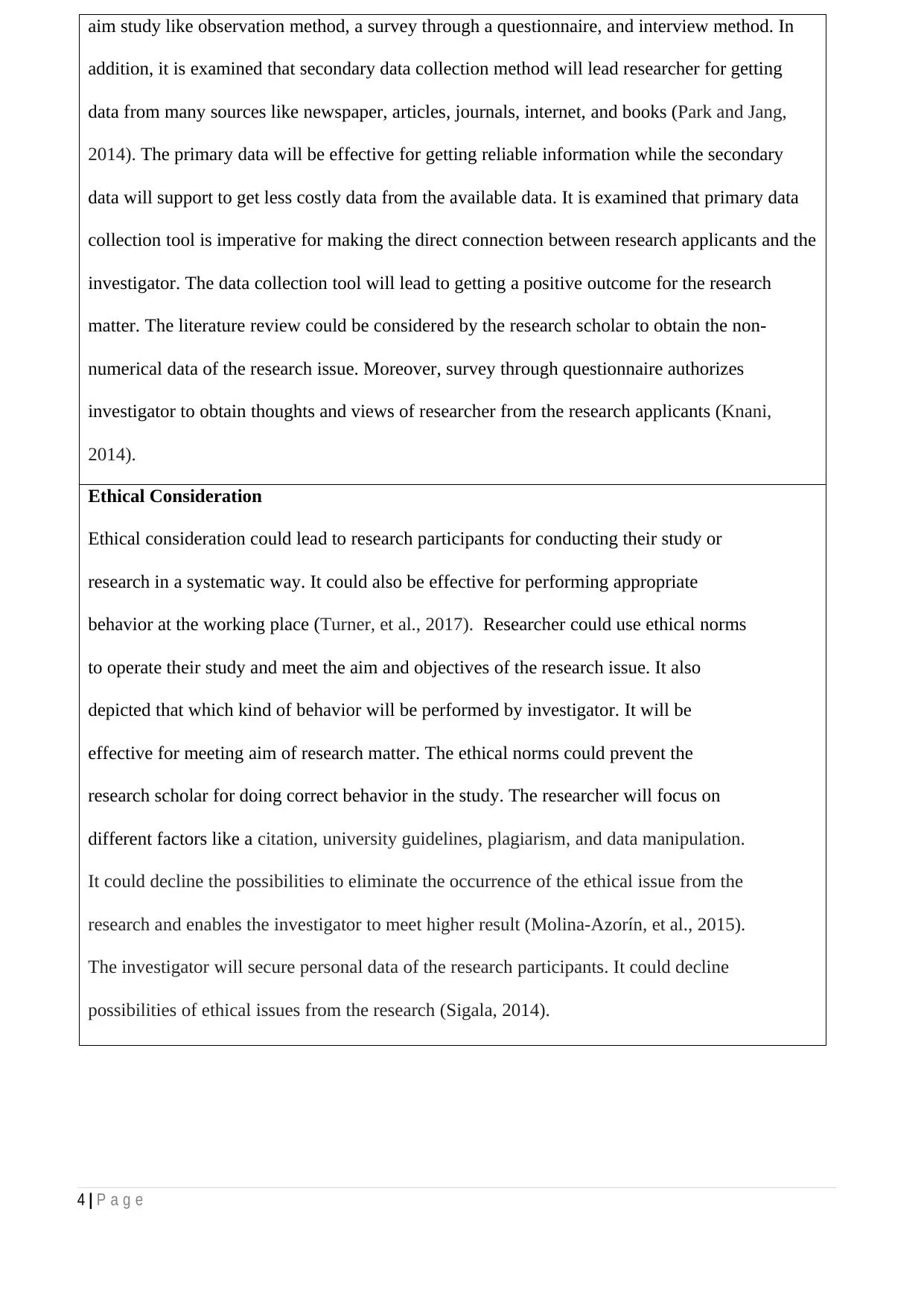
aim study like observation method, a survey through a questionnaire, and interview method. In
addition, it is examined that secondary data collection method will lead researcher for getting
data from many sources like newspaper, articles, journals, internet, and books (Park and Jang,
2014). The primary data will be effective for getting reliable information while the secondary
data will support to get less costly data from the available data. It is examined that primary data
collection tool is imperative for making the direct connection between research applicants and the
investigator. The data collection tool will lead to getting a positive outcome for the research
matter. The literature review could be considered by the research scholar to obtain the non-
numerical data of the research issue. Moreover, survey through questionnaire authorizes
investigator to obtain thoughts and views of researcher from the research applicants (Knani,
2014).
Ethical Consideration
Ethical consideration could lead to research participants for conducting their study or
research in a systematic way. It could also be effective for performing appropriate
behavior at the working place (Turner, et al., 2017). Researcher could use ethical norms
to operate their study and meet the aim and objectives of the research issue. It also
depicted that which kind of behavior will be performed by investigator. It will be
effective for meeting aim of research matter. The ethical norms could prevent the
research scholar for doing correct behavior in the study. The researcher will focus on
different factors like a citation, university guidelines, plagiarism, and data manipulation.
It could decline the possibilities to eliminate the occurrence of the ethical issue from the
research and enables the investigator to meet higher result (Molina-Azorín, et al., 2015).
The investigator will secure personal data of the research participants. It could decline
possibilities of ethical issues from the research (Sigala, 2014).
4 | P a g e
addition, it is examined that secondary data collection method will lead researcher for getting
data from many sources like newspaper, articles, journals, internet, and books (Park and Jang,
2014). The primary data will be effective for getting reliable information while the secondary
data will support to get less costly data from the available data. It is examined that primary data
collection tool is imperative for making the direct connection between research applicants and the
investigator. The data collection tool will lead to getting a positive outcome for the research
matter. The literature review could be considered by the research scholar to obtain the non-
numerical data of the research issue. Moreover, survey through questionnaire authorizes
investigator to obtain thoughts and views of researcher from the research applicants (Knani,
2014).
Ethical Consideration
Ethical consideration could lead to research participants for conducting their study or
research in a systematic way. It could also be effective for performing appropriate
behavior at the working place (Turner, et al., 2017). Researcher could use ethical norms
to operate their study and meet the aim and objectives of the research issue. It also
depicted that which kind of behavior will be performed by investigator. It will be
effective for meeting aim of research matter. The ethical norms could prevent the
research scholar for doing correct behavior in the study. The researcher will focus on
different factors like a citation, university guidelines, plagiarism, and data manipulation.
It could decline the possibilities to eliminate the occurrence of the ethical issue from the
research and enables the investigator to meet higher result (Molina-Azorín, et al., 2015).
The investigator will secure personal data of the research participants. It could decline
possibilities of ethical issues from the research (Sigala, 2014).
4 | P a g e
Paraphrase This Document
Need a fresh take? Get an instant paraphrase of this document with our AI Paraphraser
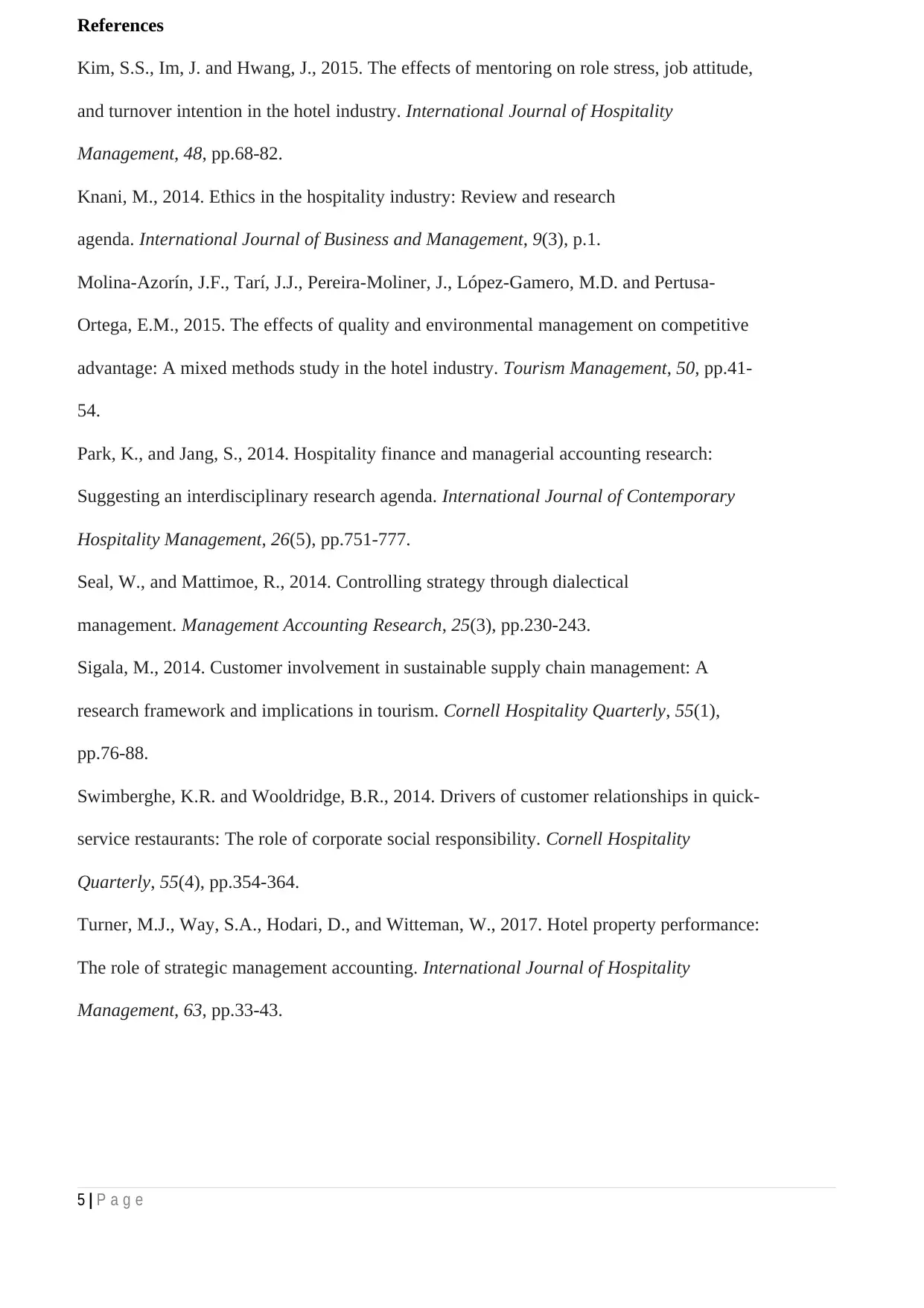
References
Kim, S.S., Im, J. and Hwang, J., 2015. The effects of mentoring on role stress, job attitude,
and turnover intention in the hotel industry. International Journal of Hospitality
Management, 48, pp.68-82.
Knani, M., 2014. Ethics in the hospitality industry: Review and research
agenda. International Journal of Business and Management, 9(3), p.1.
Molina-Azorín, J.F., Tarí, J.J., Pereira-Moliner, J., López-Gamero, M.D. and Pertusa-
Ortega, E.M., 2015. The effects of quality and environmental management on competitive
advantage: A mixed methods study in the hotel industry. Tourism Management, 50, pp.41-
54.
Park, K., and Jang, S., 2014. Hospitality finance and managerial accounting research:
Suggesting an interdisciplinary research agenda. International Journal of Contemporary
Hospitality Management, 26(5), pp.751-777.
Seal, W., and Mattimoe, R., 2014. Controlling strategy through dialectical
management. Management Accounting Research, 25(3), pp.230-243.
Sigala, M., 2014. Customer involvement in sustainable supply chain management: A
research framework and implications in tourism. Cornell Hospitality Quarterly, 55(1),
pp.76-88.
Swimberghe, K.R. and Wooldridge, B.R., 2014. Drivers of customer relationships in quick-
service restaurants: The role of corporate social responsibility. Cornell Hospitality
Quarterly, 55(4), pp.354-364.
Turner, M.J., Way, S.A., Hodari, D., and Witteman, W., 2017. Hotel property performance:
The role of strategic management accounting. International Journal of Hospitality
Management, 63, pp.33-43.
5 | P a g e
Kim, S.S., Im, J. and Hwang, J., 2015. The effects of mentoring on role stress, job attitude,
and turnover intention in the hotel industry. International Journal of Hospitality
Management, 48, pp.68-82.
Knani, M., 2014. Ethics in the hospitality industry: Review and research
agenda. International Journal of Business and Management, 9(3), p.1.
Molina-Azorín, J.F., Tarí, J.J., Pereira-Moliner, J., López-Gamero, M.D. and Pertusa-
Ortega, E.M., 2015. The effects of quality and environmental management on competitive
advantage: A mixed methods study in the hotel industry. Tourism Management, 50, pp.41-
54.
Park, K., and Jang, S., 2014. Hospitality finance and managerial accounting research:
Suggesting an interdisciplinary research agenda. International Journal of Contemporary
Hospitality Management, 26(5), pp.751-777.
Seal, W., and Mattimoe, R., 2014. Controlling strategy through dialectical
management. Management Accounting Research, 25(3), pp.230-243.
Sigala, M., 2014. Customer involvement in sustainable supply chain management: A
research framework and implications in tourism. Cornell Hospitality Quarterly, 55(1),
pp.76-88.
Swimberghe, K.R. and Wooldridge, B.R., 2014. Drivers of customer relationships in quick-
service restaurants: The role of corporate social responsibility. Cornell Hospitality
Quarterly, 55(4), pp.354-364.
Turner, M.J., Way, S.A., Hodari, D., and Witteman, W., 2017. Hotel property performance:
The role of strategic management accounting. International Journal of Hospitality
Management, 63, pp.33-43.
5 | P a g e
1 out of 5
Related Documents
Your All-in-One AI-Powered Toolkit for Academic Success.
+13062052269
info@desklib.com
Available 24*7 on WhatsApp / Email
![[object Object]](/_next/static/media/star-bottom.7253800d.svg)
Unlock your academic potential
Copyright © 2020–2026 A2Z Services. All Rights Reserved. Developed and managed by ZUCOL.





